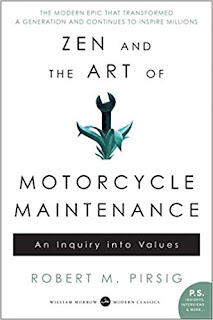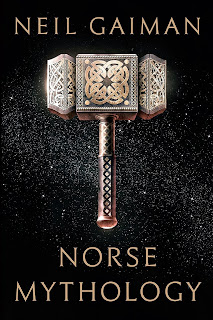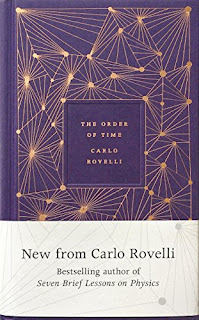A Road Movie in Writing
Zen and the Art of Motorcycle Maintenance
Robert M. Pirsig
This is a difficult review to write. I have started twice and both times found my mind walking multiple paths and selecting none. This is the third attempt.
Part of the reason, why this is difficult, is that the book has at least four interwoven narratives. There’s the road trip. There’s the life of Phaedrus. The father-son relationship. And the story of Quality. These narratives intertwine, one becomes a metaphor for the other, merge and separate again. Admittedly, the fame and influence of the book derived from the narrative of Quality, but should that be the one to review? Or should all four be reviewed?
Should you choose to pick up the book, please allow me to give you two warnings. First, it’s no quick read. At times, I was captivated, turning page after page into the wee hours of the night. At others, while remaining a good read, it slowed down to the point where I had days, perhaps as much as a week between chapters. Then there are passages, where quick reading isn’t possible, due to the density of thought. You read a paragraph, take a sip, look into the distance, re-read the paragraph. Second, be prepared to read it more than once. Disclaimer – at the time of writing this, I haven’t. But I strongly suspect that new layers open up as one goes through these pages more than once. Definitely a book for re-reading multiple times, if ever there was one.
As a teacher of argument skills…well, Phaedrus was a teacher of rhetoric. The whole book is cognitively very well structured. There’s a high degree of order, of clarity. I'm always on the lookout for people that have attained clarity via the cognitive route, so it was a considerable joy to discover that Robert Pirsig has taken the path and written about it via Phaedrus. In this sense, the book reads like scripture, albeit a narrative one.
A few months ago I had the pleasure of working with a young lady from English College to moderate a discussion. I sensed in her the potential to follow down the same path. I told her about this in a roundabout way and asked her to come to me, if she ever finds herself in a moment of desperation. Pirsig, interestingly, has chosen to drive Phaedrus beyond that point in the book, to full-blown mental disorder, at least as viewed from the outside. Which then becomes the crossroads tension point in the father-son relationship narrative.
Once the mind is clear, it, of course, makes no difference whether this is practiced and described via mastering computer games, doing calligraphy, playing an instrument, cooking or, as in this case, repairing a motorcycle. No difference at all. It takes very many words in this book to say what it wants to say. It feels more like the writing of it was a literary road trip for the author. And reading it as a road … story, if there is such a term, is the frame of mind I would suggest. Naturally, invoking some Marlon Brandoish imagery in the 70s made success that much more likely.
There is a section, about two thirds of the way in, lasting for a few chapters, that deals with zen and motorcycle maintenance in parallel, expounding upon Quality. That part, for me, was a polished gem. Up there with, dare I write it, the river scene from Siddhartha, for example. When you find the road trip takes too long to get going, bare with it. Your patience will be well rewarded. And yes, you do need to read the rest of it, to appreciate the marrow. I actually think Pirsig wrote this part first, and the rest of it later as a sequel-prequel to that core segment. Just a guess, though.
As a critique of Aristotelian paradigm? Yes, if you’re thus inclined. If you can recognize the relevant social and educational conditioning in yourself.
So what about the main Quality storyline? What about Quality? Tao defined is not the true Tao. Without having realized it, the book might be incomprehensible. Having realized it, the book might even feel a bit … unnecessary?
Nevertheless, I will keep recommending it in the hopes, that someone will take steps closer to clarity as a result of reading it. So on the recommendation scale, it’s a 5 out of 5.




Comments
Post a Comment